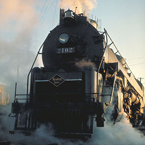Memories of Disaster: on the Set of "The Day After Tomorrow"

Note: this article has nothing really to do with Web History, but heck - even I can depart from this subject occasionally, can't I?
Disaster movies are not ordinarily my cup of tea, but I had the opportunity - back in late 2002, to play a tiny part in the 20th Century Fox picture, The Day After Tomorrow - a $125 million mega epic that, at least according to the New York Times, "ignited tempers" across Hollywood and the political landscape.
If you've seen the online previews or have actually sat through this movie, you know what happens. Global Warming - no doubt in no small part caused by President Bush's abandonment of the Kyoto Accords, causes such hellishly bad weather across the world that Tokyo is smashed by a hailstorm, Los Angeles blown to bits by a Tornado, and New York swamped by 90-foot tidal waves that freeze within a matter of hours.
What happened on the set was almost as bad.
Let me tell you a little bit about being an extra on the site of a disaster movie. Contrary to what you see on the big screen, we extras (otherwise known as "background actors") aren't actually drowned by tsunamis, impaled by sharp objects blown loose by 200-MPH winds, crushed by giant hailstones, or sent toppling over 300-foot glacial chasms. Hollywood put an end to such practices long ago; today, all of that fancy bone-crushing stuff happens in post-production, aided by CG (Computer Graphics) special effects.
The extras, and in The Day After Tomorrow's case there were 450 of us called down to Lower Manhatan for the shoot, have a generally less hazardous job. All we generally do is march faithfully from point A to point B when the director and his team of PA's (Production Assistants) hollar "Background!" and from B to A when someone screams "Reset!" We march faithfully back and forth, back and forth -- just human, out-of-focus blurs -- until the high-priced talent, AKA the stars, or principle actors, stop flubbing their lines, a process that with good talent can take several minutes, but with lousy talent can take hours - sometimes longer.
On this particular day, which was in late November, the set was outdoors - Trinity Place - just a few blocks from the real-life disaster that is Ground Zero. In 6:00 AM darkness, 450 extras filed out from our "Holding" area - the decaying lobby of an abandoned luxury hotel - into the gloom of lower Manhattan.
Out in the street, high up on a "cherry picker" crane was a super wide-screen Panavision camera. Below it was a huge simulated traffic jam consisting of at least 100 cars, taxicabs, trucks and at least six rented Transit Authority buses, that stretched for eight blocks. From up above, high above the jammed, simulated urban gridlock, perched on a crane, came the booming voice of Roland Emmerich, the director.
"Now everybody", hollared Emmerich through a loudspeaker and a network of walkie talkies held by his PA's, "I want you to imagine that there are birds flying around - big tropical birds. We'll paint them in with CG later. Look up at the birds from time to time, but keep walking. Just remember, I don't want you ALL to look up at them - just a few of you. Remember, you are New Yorkers, so you're not really fazed by anything."
The camera begins to whir, the clapper is clapped, and we do as Emmerich tells us, again and again, marching from street corner to street corner. "Reset!" screams the PA, sending me back to Point A. "Background!" shouts another. I do it again. After about ten times, my performance is just about perfect - even though I know that my expert walking will only show up as a tiny speck on the screen.
(Note: I haven't actually seen The Day After Tomorrow, but I'm sure that if you look closely at the scene where the CG-painted tropical birds fly over Wall Street, that guy with the trenchcoat at the lower right-hand corner of the screen is me. See him, there? First he looks up at the flock of imaginary macaws hurtling towards him, ducks, and then goes back to reading The Wall Street Journal, just like a true New Yorker. "Who the hell cares about birds when Allen Greenspan is threatening to raise interest rates," he seems to be saying - at least for four frames.)
If I'm making my 12-hour day on the set of The Day After Tomorrow into a summer lark, it was anything but. Although the scene in which myself and 450 other extras walked from point A to point B was supposed to be set in summer, of course, it was actually winter - in fact, the shoot happened in the coldest 18-degree weather and whipping winds that I've ever experienced: the kind of weather where your spit turns to ice before it bounces on the sidewalk.
Naturally, the last thing that Roland Emmerich wanted was anyone to criticize his film for looking fake. So instead of being ordered to bundle up, all 450 extras were instructed to strip off all of our winter clothing for the purposes of "authenticity," and that's where the trouble really started.
By 10:00 AM - about 3 hours into the shoot, several extras were already suffering from respiratory wheezing, head colds, chapped, red skin, and other symptoms of hypothermia induced by the howling winds. By noon, a small crowd of us were already hiding out in a Citibank ATM shelter, and any PA that came near was threatened with physical force if he or she attempted to shoo us back into the arctic winds.
By 1:00 PM, rebellion, even mutiny, was in the air. At a 15-minute coffee break in which the desparately cold actors attempted to get warm, an actor buddy of mine who happens to be Jewish made the mistake of attempting to pet a trained dog that was evidently one of the scene's principle actors. The dog, evidently upset at my friend's gesture, snarled at him and snapped its jaws.
The dog's German trainer set his face into an expression of rage, and screamed "I told you not to touch zis dog! No vone is to touch zis dog!"
"You worthless cur," my friend shouted at the animal, "your great-grandfather was probably at Auschwitz!"
"RAOUGH!!" the german shepherd barked, baring its razor-sharp teeth and leaping onto its hind legs, restrained only by its thick leather leash.
I'm certain that things would quickly have become bloody had not the dog, the trainer, and the actors not been called back out into the howling cold for a re-take.
As the bitter afternoon wore on, the actors' collective situation continued to deteriorate. The trained dog, perhaps distracted by being patted, kept blowing his lines, on-cue barks, or whatever the hell else he was supposed to be doing, prompting numerous "CUT - RESET!" instructions from the PA's. The result was that hundreds of extras had to march back and forth, back and forth, for almost an hour in the excoriating winds while the dog reclaimed his motivation.
Soon, the winds had risen to 20 knots, with the temperature hovering at just 12 degrees. Under this increasing meteorological onslaught, the crowd of extras - once numbering 450 souls - was shrinking fast. Some, completely frozen, were now hiding out in the mens' room of a nearby building. Others tried to disappear behind the make-up vans, where they were not exposed to so much wind. Several women, hiding in the entrenceway of a deserted coffeeshop, had to be pushed outside by angry PA's. "Get out - GET OUT!" the PA's shouted. One of them actually hurled a recalcitrant extra onto the pavement.
Even as the thermometer plunged downward, a few extras, wearing only T-shirts and other light summer clothes, continued to walk briskly from A to B.
"How can they do that?" I asked another actor buddy as we huddled in a doorway, rubbing our ungloved hands.
"This is what happens with hypothermia", he said. "The colder you get, the warmer you feel, until you just drift away in a pool of warmness into welcoming death. This is why ships that find people who've drowned in the North Atlantic often find the bodies with smiles on their faces - because at the final stages, it's actually pleasant..."
I shuddered, and moved on, traces of ice forming inside my nostrils. At around 4:45, the dog had mastered his lines, and Emmerich was "checking the gate" - shorthand for evaluating the filmed material before moving on to another shot. At last, we were told to take another break. On frozen feet we marched back to the Holding Area one last time, sub-zero shadows of our former selves.
The shoot wrapped at about 5:00 PM and we - the 450 cold, the frozen, the sneezing and red-eyed victims of this sinister ritual that is the Hollywood Disaster Movie, soon dispersed, to spend the next twelve hours hacking, coughing, and swilling Nyquil.
I went home; Emmerich and his crane, the vans, the lights, the trained dogs, and the sadistic PA's were soon just bad memories. A few weeks later, I got my $67.50 check and have not once thought about The Day After Tomorrow.
Until that fateful day in May of 2004. There on a Broadway phone booth was a truly frightening poster for the film showing New York's poor old Stature of Liberty, covered with ice, her torch peeking out of a mammoth ice drift. Behind her, Manhattan sprawled lifeless and frozen.
Yes, seeing Lady Liberty in such dire straits is a powerful image (although it's been used before, most notably in Planet of the Apes - a movie made more than 35 years ago). And yes, Global Warming is something that we should be worrying about before the waves start lapping over Central Park. But I'm not convinced that the best way to go about this task is to see The Day After Tomorrow. The ends of the film - to raise awareness about Global Warming - might be noble, but the means used - at least on the shoot I was on - were cruelly inhumane.
Sure, Alfred Hitchcock once said that "actors should be treated like cattle" but I'm sure that even crochety old Hitch didn't mean this statement literally.
What's next on the movie set, abbatoirs with dual entrances, one for SAG, the other for non-SAG actors?
Unfortunately, most people who work in Hollywood don't speak out about the cruel antics that go on there, because they're scared to death of never working in films again. The 450 frozen extras on the set that day weren't cows, they were human beings, and they can speak, and write, and protest, or even do other, non-showbiz jobs. But they do not, because they fear reprisal, or perhaps, and this is even sadder, because they're so used to this kind of treatment that they believe it is normal.
I will pass on seeing The Day After Tomorrow, even though I agree with its message, because I will never fully shake the chill I got on the coldest day I'll ever know - the one ruled by Roland Emmerich, who, from the warm comfort of his fur-lined jacket, commanded his anonymous, poorly-clad, frozen army of extras to the brink of disaster - and beyond!
The Day After Tomorrow opened May on 28th, 2004. Ghost Sites resumes its normal programming tomorrow. I promise I won't mention working in the movies again - say what you like about The Internet Business - it's a lot less crazy than Hollywood.



